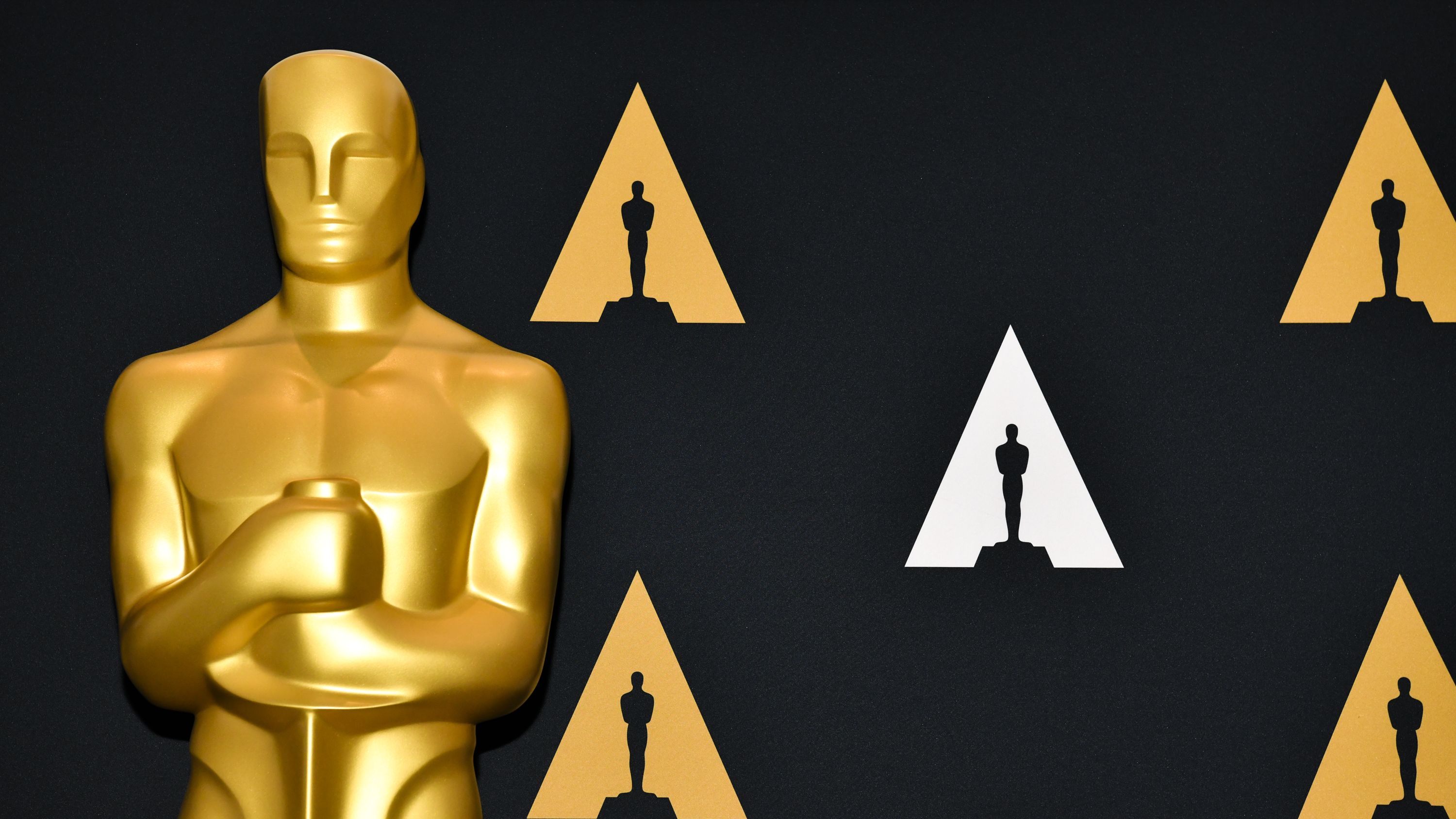The 2021 Oscars: All Your Questions, Answered
Like, will people in hazmat suits be delivering statuettes to the winners' homes again?


It'll be a long time before we all forget those videos of people dressed in hazmat tuxedos and sent to wait outside each 2020 Emmy nominee's home, ready to safely hand over golden statuettes for the largely virtual event. Between that and the fact that social distancing policies are expected to stay in place for a good chunk of the next year, there are plenty of questions in the air about what 2021's Hollywood award ceremonies will look like. Add on the massive toll that 2020 took on the moviemaking industry as a whole, and it's safe to assume that the next year's worth of award shows will look completely different from years past.
First up will be the Golden Globes, which have been pushed back from their usual early January timeframe to air instead at the end of February, though organizers have yet to announce whether nominees will be invited to attend the event in person or virtually. Meanwhile, the powers that be over at the Academy of Motion Picture Arts and Sciences are said to be considering an in-person Oscars, which have also been postponed to the end of April. Here's everything we know so far about what "Hollywood's biggest night" will look like in 2021.
When and where will the 2021 Oscars be held?
The Academy Awards are typically scheduled for the end of February or early March to cap off awards season, but they were bumped up to the beginning of February in 2020 to combat awards overload and induce higher ratings. That didn't really work, so the Oscars' new, later date shouldn't have too much of an effect on the show's consistently declining viewership. The 2021 ceremony will be broadcast live on ABC on April 25 from L.A.'s Dolby Theatre, which has been the home of the Oscars since 2002.
Will there be an Oscars host for 2021?
If so, they haven't been announced yet. It seems unlikely, though: For one thing, the last two ceremonies were both hostless and deemed relative successes (low ratings notwithstanding). For another, after the 2020 Oscars, ABC executive Robert Mills told Entertainment Tonight that if they decided to revert to having a host, that person would need to be booked well in advance; if they had done so, it seems likely that we would have heard about it by now.
And finally, you would be hard-pressed to find someone in Hollywood willing to take on the job, which has been described as a "no-win gig" by past host Jimmy Kimmel. Oscars hosts are often ridiculed for months or even years after a less than stellar job (ahem, Anne Hathaway and James Franco), and anyone who accepts the job is immediately scrutinized—to the point of forcing some of them to back out and, in the case of Kevin Hart in 2019, sending the Academy scrambling to produce a hostless show.
How will COVID change the Oscars in 2021?
The pandemic has and will likely continue to have a huge impact on the award show, perhaps most significantly in the lack of eligible movies. With movie theaters struggling to safely stay open all year, countless films either postponed their release dates to 2021 and beyond or skipped the theatrical release altogether in favor of an all-streaming rollout. As a result, the Academy updated its eligibility rules in October to bring straight-to-streaming movies into the running for awards if they were originally supposed to have a theatrical release. Additionally, another update to theatrical release rules allows drive-ins to qualify as official, eligibility-granting theaters, as long as they showed Oscar hopefuls at least once a day for a full week.
The Academy is further attempting to expand the pool of eligible films with its new timeline. The Oscars are in April this time around because the qualifying period for release dates now stretches well past the usual Dec. 31, to Feb. 28, 2021. With that, preliminary voting will begin on Feb. 1, followed by voting on the resulting shortlists March 1-5. Nominees will then be announced on March 15, with official voting beginning one month later and lasting until April 20. The winners will then be announced just a few days later, at the April 25 ceremony.
Get exclusive access to fashion and beauty trends, hot-off-the-press celebrity news, and more.
As for what the actual ceremony will look like in the time of COVID, the Academy and ABC have yet to provide many details. A source told Variety at the beginning of December that organizers were exploring safety protocols that might allow for an in-person event, but have yet to decide either way. "We find ourselves in uncharted territory this year and will continue to work with our partners at the Academy to ensure next year's show is a safe and celebratory event," is all Karey Burke, president of ABC Entertainment, said in a recent release about the updated Oscars timeline. Time to break out the hazmat tuxes again!
How else will the 2021 Oscars differ from years past?
There are a few changes that will take effect with the upcoming 93rd Academy Awards that, refreshingly, have nothing to do with COVID. In April, officials voted to reduce the number of categories by one, combining the Best Sound Mixing and Best Sound Editing categories into the singular Best Sound award. Additionally, the Best Original Score category will be a bit more discerning, with movie scores in the running now required to comprise 60 percent original music; franchise and sequel films' scores must be 80 percent new. Furthermore, all Academy voters will now be allowed to participate in preliminary voting rounds for the Best International Feature Film category, which was previously relegated to a small committee of volunteers.
And in a long overdue, eco-friendly update, this will be the last year in which physical copies of eligible works—screener DVDs, score CDs, and printed screenplays—will be distributed to voters. Wait—people still have DVD players?
What movies are in the running for Oscars for 2021?
It's been a very tough, very weird year but, somehow, we've still been blessed with a surprising number of Oscar-worthy films. In the Best Picture category, Netflix is predicted to reign supreme, with Mank, Ma Rainey's Black Bottom, The Trial of the Chicago 7, Da 5 Bloods, and Hillbilly Elegy among its high-quality offerings this year. Other contenders include Pixar's Soul, Judas and the Black Messiah (which will be released on HBO Max in early 2021 as part of the streamer's partnership with Warner Bros.), and Nomadland, which stars Frances McDormand and received universally rave reviews after its September debut at the Venice Film Festival.
Beyond that, in the major acting categories, we could potentially see Amy Adams finally take home a statuette for her work in Hillbilly Elegy (seventh nom's the charm!)—though she'll likely be competing for Best Actress against major heavyweights including McDormand, Viola Davis, Kate Winslet, and Carey Mulligan, to name just a few. Chadwick Boseman, meanwhile, could be granted an Oscar for his lead role in Ma Rainey's Black Bottom or his supporting turn in Da 5 Bloods, making him only the third person to earn a posthumous Oscar for acting; Anthony Hopkins, Steven Yeun, Riz Ahmed, and Gary Oldman are expected to also be in the running for Best Actor.
Andrea Park is a freelance writer for Marie Claire, where she writes mainly about pop culture, drawing on her lifelong obsessions with consuming every book, movie, and TV show she can get her hands on. Andrea is based in Chicago and graduated from Northwestern University's Medill School of Journalism and Columbia University's Graduate School of Journalism. Her byline has also appeared in W, Glamour, Teen Vogue, PEOPLE, and more.
